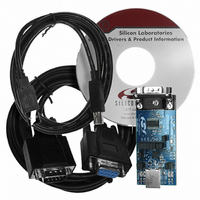CP2103EK Silicon Laboratories Inc, CP2103EK Datasheet - Page 14

CP2103EK
Manufacturer Part Number
CP2103EK
Description
KIT EVAL FOR CP2103 USB TO UART
Manufacturer
Silicon Laboratories Inc
Specifications of CP2103EK
Main Purpose
Interface, USB 2.0 to UART (RS232) Bridge
Embedded
No
Utilized Ic / Part
CP2103
Primary Attributes
Full Speed, 300 bps to 1 Mbps
Secondary Attributes
Software, Connector Provides Direct Access to UART Signals
Processor To Be Evaluated
CP2103
Interface Type
RS-232, USB
Silicon Manufacturer
Silicon Labs
Silicon Core Number
CP2103
Kit Contents
Evaluation Board, RS-232 Cable, USB Cable And Driver CD
Development Tool Type
Hardware / Software - Eval/Demo Board
Lead Free Status / RoHS Status
Contains lead / RoHS non-compliant
Lead Free Status / RoHS Status
Lead free / RoHS Compliant, Contains lead / RoHS non-compliant
Other names
336-1163
Available stocks
Company
Part Number
Manufacturer
Quantity
Price
Company:
Part Number:
CP2103EK
Manufacturer:
Silicon Labs
Quantity:
135
CP2103
5. Asynchronous Serial Data Bus (UART) Interface
The CP2103 UART interface consists of the TX (transmit) and RX (receive) data signals as well as the RTS, CTS,
DSR, DTR, DCD, and RI control signals. The UART supports RTS/CTS, DSR/DTR, and X-On/X-Off handshaking.
The UART can be programmed to support a variety of data formats and baud rates. If the Virtual COM Port drivers
are used, the data format and baud rate are set during COM port configuration on the PC. If the USBXpress drivers
are used, the CP2103 is configured through the USBXpress API. The available data formats and baud rates are
listed in Table 9.
6. GPIO Pins
The CP2103 supports four user-configurable GPIO pins for status and control information. More information
regarding the configuration and use of these pins can be found in “AN144: CP21xx Device Customization Guide”
and “AN223: Port Configuration and GPIO for CP210x” available at
7. Internal EEPROM
The CP2103 includes an internal EEPROM that may be used to customize the USB Vendor ID (VID), Product ID
(PID), Product Description String, Power Descriptor, Device Release Number, and Device Serial Number as
desired for OEM applications. If the EEPROM is not programmed with OEM data, the default configuration data
shown in Table 10 is used.
While customization of the USB configuration data is optional, it is recommended to customize the VID/PID
combination. A unique VID/PID combination prevents the driver from conflicting with any other USB driver. A
vendor ID can be obtained from www.usb.org, or Silicon Labs can provide a free PID for the OEM product that can
be used with the Silicon Laboratories VID. It is also recommended to customize the serial number if the OEM
application is one in which it is possible for multiple CP2103-based devices to be connected to the same PC.
The internal EEPROM is programmed via the USB. This allows the OEM's USB configuration data and serial
number to be written to the CP2103 on-board during the manufacturing and testing process. A stand-alone utility
for programming the internal EEPROM is available from Silicon Labs. A library of routines provided in the form of a
Windows
software used by the OEM to streamline testing and serial number management during manufacturing. The
EEPROM has a typical endurance of 100,000 write cycles with a data retention of 100 years. USB descriptors can
be locked to prevent future modification.
14
Notes:
Baud Rates
Parity Type
Stop Bits
Data Bits
1. 5-bit only.
2. Additional baud rates are supported. See “AN205: CP210x Baud Rate Support”.
3. 7 or 8 data bits only.
®
DLL is also available. This library can be used to integrate the EEPROM programming step into custom
2
5, 6, 7, and 8
1, 1.5
None, Even, Odd, Mark, Space
300, 600, 1200, 1800, 2400, 4000, 4800, 7200, 9600, 14400, 16000, 19200, 28800, 38400,
51200, 56000, 57600, 64000, 76800, 115200, 128000, 153600, 230400, 250000, 256000,
460800, 500000, 576000, 921600
1
, and 2
Table 9. Data Formats and Baud Rates
3
Rev. 1.0
www.silabs.com.












